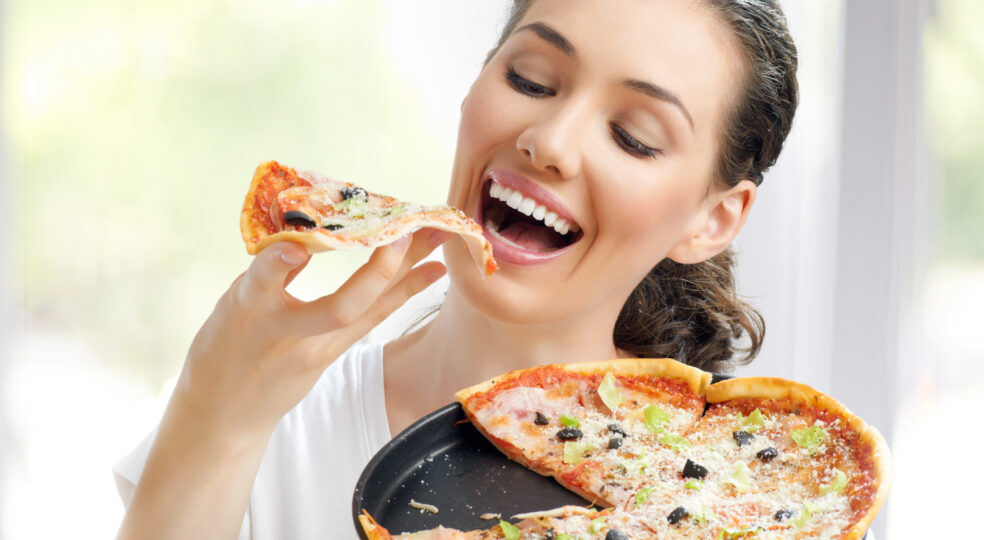
For breakfast, you only had a small yogurt with your coffee instead of a jam sandwich so as not to consume too many calories. At lunchtime, you cast a longing glance at the delicious portion of pasta, but then reach for the salad instead, because carbohydrates make for waist fat. In the evening, "dinner cancelling" is on the menu, as this is known to melt the pounds. But - Intuitive Eating offers you exactly what you've always wanted: Enjoyment without a guilty conscience.
Is eating with pleasure and without regret a beautiful but seemingly unattainable dream for you? You can make it come true if you throw overboard all the rules and prohibitions that haunt your mind when it comes to eating. Start to pay attention to your Listen body. We'll show you how.
This concept is literally about listening to your gut. When you feel hungry, you eat - and you eat exactly what you feel like. When you're full, you stop, even if your plate isn't empty. What reads so simply is often difficult to put into practice, because most people have forgotten how to listen to their body's signals. We are practically born with a natural feeling of hunger and satiety, but as we get older, we lose most of it.
Through intuitive eating, you reclaim it. You learn to listen to your body's signals again and trust them. There are no bans, no calorie counting, and no "good" or "bad" foods. Of course, this doesn't mean eating whatever you feel like around the clock. When you eat intuitively, you develop Mindfulness for your body and the food you eat.
You recognize what is good for you and what your body needs at the moment. You learn to enjoy consciously. Especially if your life has been dominated by diets, calorie counting and prohibitions, you need some time to internalize the concept. But the following ten basic principles can help you integrate intuitive eating into your everyday life.

Nowadays, eating is usually no longer linked to a feeling of hunger. We eat because it's time for lunch or dinner, because we're stressed or sad, or simply bored. You've probably comforted yourself with a bar of chocolate on more than one occasion. But this so-called "emotional eating" can quickly give you a few unwanted extra pounds.
Then it's time for a diet, because after all you want to conform to the ideal image propagated by society. When you have lost weight and return to your normal eating habits, the infamous yo-yo effect usually strikes and the cycle starts all over again.
As early as the early 1970s, nutritionist Thelma Wayler said that diets do not bring long-term success, but only a change in lifestyle and a mindful approach to one's own body. The term "intuitive eating" was coined by Evelyn Tribole and Elyse Resch in 1995. They wrote a book about it and recorded the ten basic principles. They are, so to speak, the only "rules" you should follow:
Individual studies on this topic have concluded that intuitive eaters are more satisfied with their bodies. According to British scientists, they also have a lower BMI, are more balanced and happierbecause they have to do without practically nothing. The dreaded yo-yo effect also does not occur with intuitive eating. A study conducted in 2015 by researchers at Cornell University in New York confirms these findings.
The test subjects, who were divided into two groups, were on the one hand people who eat intuitively, and on the other hand people who frequently diet and live very calorie-consciously. It turned out that the intuitive eaters attach great importance to high-quality ingredients, cook mainly at home and eat with pleasure. They also pay attention to their natural feelings of hunger and satiety. Feelings of guilt after rich meals were not observed in the intuitive group, in contrast to the other group.
So it becomes clear that the approach definitely plays a role. If you want to maintain a permanently relaxed relationship with food, it's worth listening to your gut and changing your eating behavior. You can find out how this works in the following.
If you've decided to practice intuitive eating in the future, you should first check your mindset and banish the words diet and calories from your brain. They subconsciously control your eating behavior and are counterproductive for intuitive eating. Don't despair if it doesn't work right away. If you've been counting calories for years, you can't flip the switch overnight. The following tips can help you do just that:
Although intuitive eating is the exact opposite of dieting, your new body awareness will show up on the scale in the long run. You've now changed your attitude towards food and eating and are conscious about what you eat and when you eat. In this way, you will automatically cut down on unnecessary meals. The kilos you then lose will not come back.
How well intuitive eating works can also Mareike Awe confirm. The doctor and nutrition expert herself has tried countless diets without lasting success. Only the conscious handling with itself and its body helped it to lose weight and to hold its well-being feeling weight. She now shares her knowledge and experience in her company intuMind with anyone who would also like to learn this method.
Mareike Awe's concept is a combination of personal development and nutrition education. She attaches great importance to finding out what has led to overweight and unhealthy eating behavior in her clients and guides them to pay close attention to what is good for them - regardless of calories or general dietary recommendations. Intuitive eating creates a new Self-esteem and the mindset is changing in many other areas of life as well.
Eat when you're hungry, stop when you're full - intuitive eating is actually quite simple and yet so difficult at first. But once you've learned to detach yourself from all dietary guidelines and nutritional recommendations, you regain the ability to listen to your body's needs and interpret its signals correctly. With intuitive eating, you not only develop a good relationship with your body: you also learn to trust your inner voice again in other areas.

